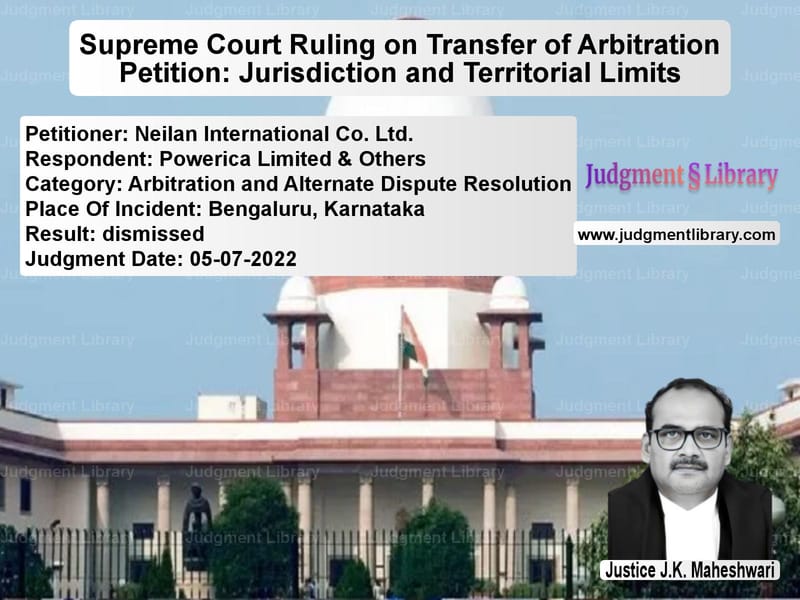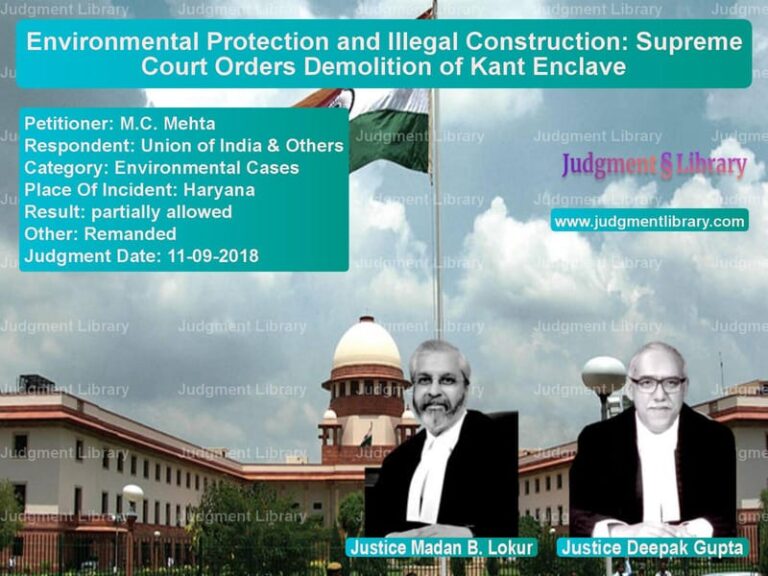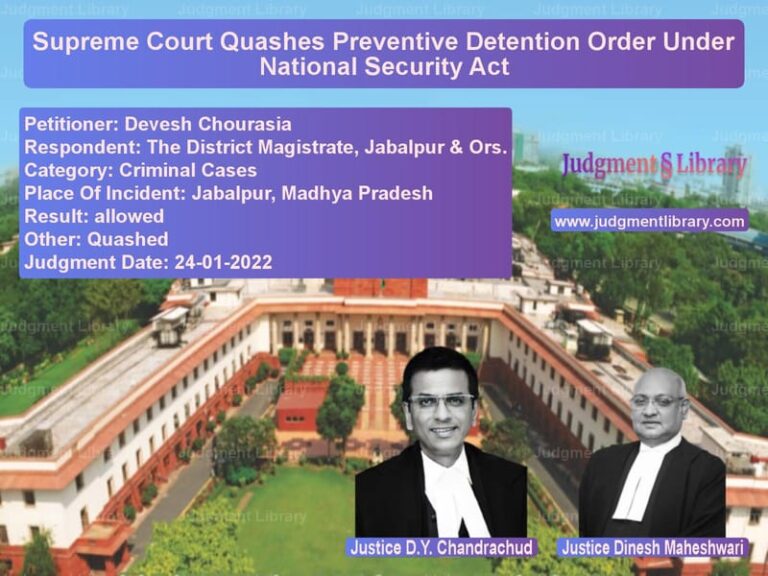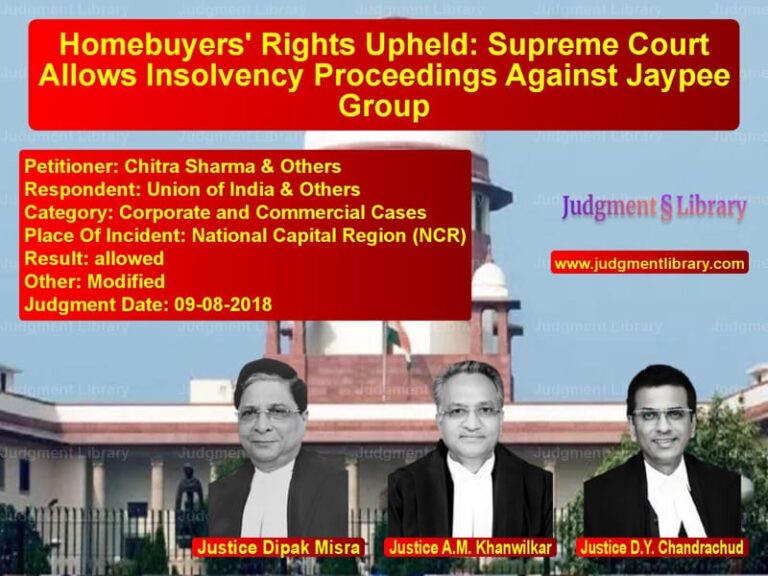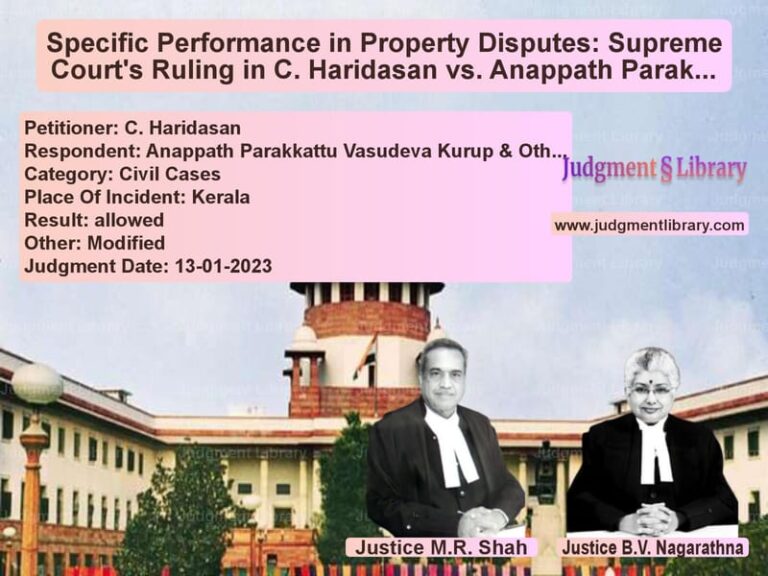Supreme Court Ruling on Transfer of Arbitration Petition: Jurisdiction and Territorial Limits
The Supreme Court of India recently adjudicated a critical case concerning the transfer of an arbitration-related dispute. The matter revolved around whether a petition under Section 34 of the Arbitration and Conciliation Act, 1996, challenging an arbitral award, could be transferred to another jurisdiction based on convenience and potential conflicting decisions. This judgment holds significant implications for arbitration law and its procedural jurisdiction.
Case Background
The dispute involved Neilan International Co. Ltd. (Petitioner) and Powerica Limited & Others (Respondents). The Petitioner sought the transfer of a commercial arbitration suit (Comm. A. S. No.09/2019) filed by the Respondents under Section 34 of the Arbitration and Conciliation Act, 1996, before the Commercial Court in Bengaluru. The Petitioner requested that the case be transferred to the Bombay High Court, where it had already filed an arbitration petition under Sections 47 and 48 of the Act, seeking enforcement of the arbitral award.
The arbitration award in question was passed on September 27, 2018, by the International Court of Arbitration in London under ICC Rules 2012. The case posed a crucial question on whether the existence of an enforcement petition in one jurisdiction could justify the transfer of a challenge petition to the same jurisdiction to avoid conflicting judgments.
Petitioner’s Arguments
- The Petitioner contended that maintaining proceedings under Section 34 of the Arbitration Act in Bengaluru would lead to conflicting judgments, as the Bombay High Court was already considering the enforcement of the award.
- It was argued that given the international nature of the arbitration, the seat was in London, and Sudanese law applied to the contract, making the application of Part I of the Arbitration Act in India invalid.
- The Petitioner asserted that since Powerica Limited had its head office in Mumbai, there would be no prejudice caused to the Respondents if the matter was transferred to the Bombay High Court.
- Furthermore, even if Indian courts had jurisdiction, the Bengaluru Court lacked jurisdiction over an international commercial arbitration, and the case should be heard by a High Court.
Respondents’ Arguments
- The Respondents countered that the plea regarding jurisdiction could not be entertained in a transfer petition before the Supreme Court.
- They cited the Supreme Court’s ruling in Naivedya Associates v. Kirti Nutrients Limited, where it was held that territorial jurisdiction should be decided by the court where the case is pending, not through a transfer petition.
- The Respondents maintained that the enforcement petition and the Section 34 petition had distinct purposes and did not warrant consolidation.
- They argued that mere convenience of a party was not a valid ground for transferring a case under Section 25 of the Code of Civil Procedure, 1908.
Supreme Court’s Observations
- The Court held that the question of territorial jurisdiction must be raised before the court in which the case is pending and cannot be adjudicated in a transfer petition.
- It reaffirmed that a Section 34 challenge and an enforcement petition under Sections 47 and 48 serve different legal purposes and thus do not automatically require adjudication by the same court.
- The Court noted that arbitration law in India, being a self-contained code, did not permit relief under the Code of Civil Procedure for transferring a case based on convenience.
- The ruling emphasized that allowing such a transfer could set a precedent that disrupts established arbitration jurisprudence.
Legal Precedents Considered
- Naivedya Associates v. Kirti Nutrients Limited (2021): Held that questions of territorial jurisdiction must be argued before the court where the suit is instituted and not through a transfer petition.
- BALCO v. Kaiser Aluminium (2012): Affirmed that foreign-seated arbitrations are generally not governed by Part I of the Arbitration Act unless explicitly agreed otherwise.
- Indus Mobile Distribution Pvt. Ltd. v. Datawind Innovations Pvt. Ltd. (2017): Held that the seat of arbitration confers exclusive jurisdiction.
Supreme Court’s Verdict
The Supreme Court dismissed the transfer petition, ruling that:
- The plea of jurisdiction should be argued before the Bengaluru Commercial Court, where the Section 34 petition is pending.
- The principle of exclusive jurisdiction does not extend to transferring arbitration-related cases under Section 25 of CPC.
- There was no sufficient reason to override established jurisdictional principles, and thus, the transfer request was without merit.
Implications of the Judgment
- Arbitration Jurisdiction Clarity: Reinforces that enforcement and challenge proceedings can be conducted in separate jurisdictions.
- Restriction on Transfer of Cases: Limits the grounds under which cases can be transferred under Section 25 of CPC.
- Emphasis on Territorial Jurisdiction: Reaffirms that jurisdictional objections must be raised before the court handling the case.
- Precedent for International Arbitration: Upholds the principle that foreign-seated arbitrations generally exclude Part I of the Indian Arbitration Act.
This ruling significantly impacts arbitration law in India, particularly in cases involving international arbitration and enforcement of foreign awards.
Petitioner Name: Neilan International Co. Ltd..Respondent Name: Powerica Limited & Others.Judgment By: Justice J.K. Maheshwari.Place Of Incident: Bengaluru, Karnataka.Judgment Date: 05-07-2022.
Don’t miss out on the full details! Download the complete judgment in PDF format below and gain valuable insights instantly!
Download Judgment: neilan-international-vs-powerica-limited-&-o-supreme-court-of-india-judgment-dated-05-07-2022.pdf
Directly Download Judgment: Directly download this Judgment
See all petitions in Arbitration Awards
See all petitions in Dispute Resolution Mechanisms
See all petitions in International Arbitration
See all petitions in Enforcement of Awards
See all petitions in Judgment by J.K. Maheshwari
See all petitions in dismissed
See all petitions in supreme court of India judgments July 2022
See all petitions in 2022 judgments
See all posts in Arbitration and Alternate Dispute Resolution Category
See all allowed petitions in Arbitration and Alternate Dispute Resolution Category
See all Dismissed petitions in Arbitration and Alternate Dispute Resolution Category
See all partially allowed petitions in Arbitration and Alternate Dispute Resolution Category

